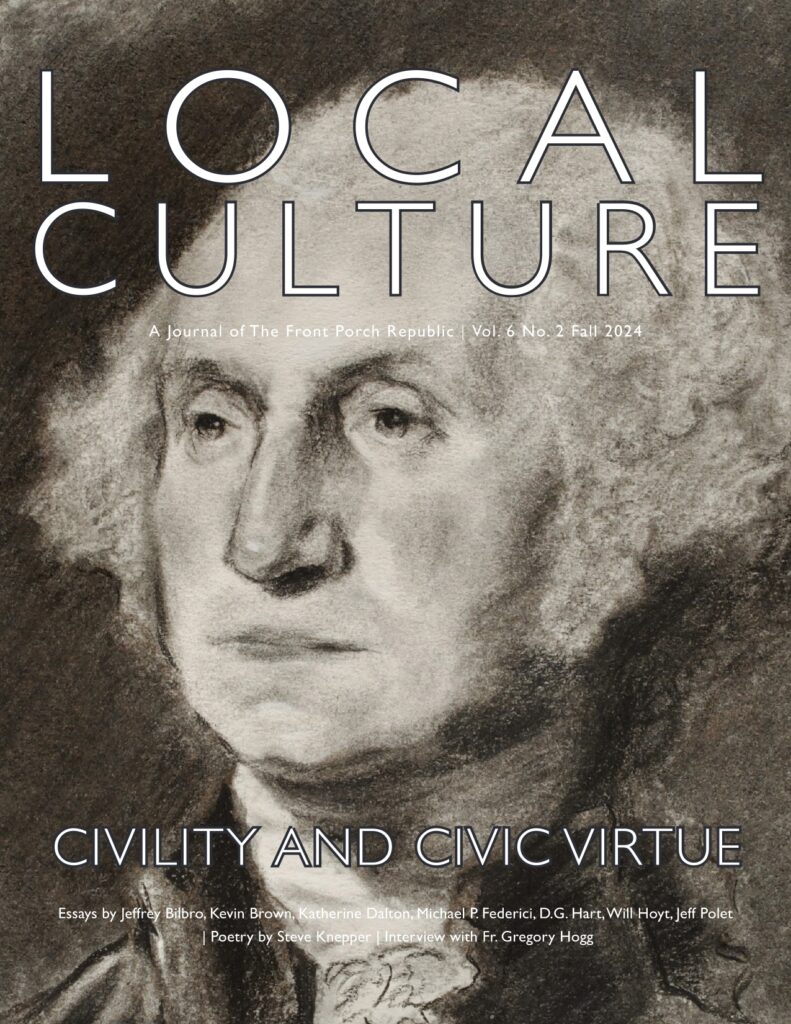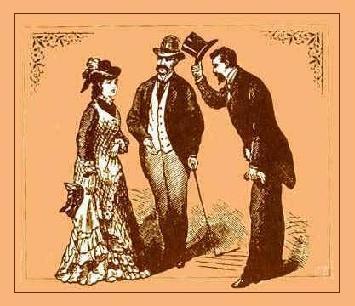If you’re interested in receiving the fall issue of Local Culture, which editor Jason Peters introduces below, you can subscribe here. Printed copies will be mailing out in the next couple of weeks.
All the world’s a stage, And all the men and women merely players; They have their exits and their entrances … —Jacques in As You Like It
An issue of Local Culture devoted to civility in the late throes of what Front Porcher Bill Kauffman has called “this wretched political year” is, if nothing else, an exercise in restraint. It is a test of localist commitments to leave alone a general election from which civility seems to have been banished as if by edict.
But restraint was my first thought when commissioning the essays collected here, and it is my last thought in introducing them. It helps that I have never had much of a stomach for presidential politics. I regard an obsession with them to be a kind of pathology. I dislike being lied to. I dislike dirty pool. And having arrived on this spinning blue sphere just six days before the assassination of our 35th president, John F. Kennedy, whose nephew briefly brought to this latest distraction the ability to speak in complete sentences, I may have had winking down upon my birth an unhappy star or a star about to die. My disposition in the old astrological sense of that word is to be, if not indifferent, uninterested.
But not disinterested. My prejudice for the local is on full display. The local is where influence of the non-planetary and non-astral sort is still possible, as many of the contributors here suggest.
I do not mean to say that there is no national stage or that the drama enacted on it has no principal parts. We know perhaps too well that there is such a stage and such actors on it, saying their lines either well or poorly. And the Leviathanic theater that we have is what it is: the work of our own hands, a wooden horse bearing our ruin that we ourselves have pushed and pulled and heaved into our own city. And of course it matters that there have been lead roles. It matters, for example, that there was a man named Truman; it mattered—more to some than to others—that he fired a man named MacArthur. And then before all that there were the bombs. It even matters that there is a spinning blue sphere we call a globe.
But none of us lives on a globe. None of us is or can be a globalist except by fatal error: a mistaken attitude toward home, for example, or a seriously flawed conception of the human person. We live or should live, each of us, in a place, and that place is our stage, and on it we have our exits and our entrances; we have our lines to say, whether we be lead or principal or chorus or “second attendant.” And it is not beside the point, it is not a matter of indifference, that we play our parts and say our lines well rather than poorly. The cosmic playwright who scripted all this would have it so; that Prospero-like comedian would have us take with full seriousness the words of Puck at the end of A Midsummer Night’s Dream: “Give me your hands, if we be friends.” That is, ‘if we have played upon this stage well, applaud us. Approve.’ On the national stage, by contrast, where all is distant and oblivious of us, there is naught but approval ratings and the dubious means of collecting and interpreting them and the means more dubious still of reporting them. All across the fruited plain the quantifiers chase a precision that eludes them.
But a neighbor in conversation, as he rests on his rake handle or walks her dog, is not so slippery, nor will a community built to scale fail to make you understand pretty quickly that, given what it’s seen of you, it doesn’t want an encore. Those are but two advantages of living in a place rather than on a globe.
And I would also say that if the explanatory metaphor of the theater (“all the world’s a stage … ”) cannot mean for us what it meant for an earlier age and for its great bard, then we might at least keep in mind the importance of proximity and presence and real encounters of flesh and blood. For the messy business of politics let us have Chesterton’s quip: “It is hard to make government representative when it is also remote.” Jeff Polet, not here but elsewhere, has written:
For the Anti-federalists the connection between a representative and the place he was from was an essential one. They wanted to keep that person in that place, meaning they favored part-time legislatures and local government and term-limits that insured that elected officials would continue to live among their neighbors and thus have to answer to them. Brutus observed that “the confidence which the people have in their rulers, in a free republic, arises from their knowing them, from their being responsible to them for their conduct, and from the power they have of displacing them when they misbehave: but in a republic of the extent of this continent, the people in general would be acquainted with very few of their rulers: the people at large would know little of their proceedings, and it would be extremely difficult to change them.”
What are the chances of doing that now?
If I am implying that the place, that the near-at-hand, that the local should get the bulk of our attention, and I am, then I am also saying that that place will be the locus of real civility and manners. It will be the place where we are best tutored in civility and in civic virtue, for there we will be answerable for our conduct in ways no one trolling the fetid bowels of the internet can or ever will be. We might still prove unequal to the demands of civil behavior, but will the grand and the global serve us any better?
We need not search high and low for proof. This is simply a matter of scale and of the lessons that both scale and place have to teach us, if only we were their worthy pupils. I see no shortcut here, no way around this fact. Taking the crowded frenetic bypass means only that we will never see the center, which, for want of being seen and known, cannot hold. Who among the peripatetic is there to hold it together? By now our condition is to be gone, away, en route. Is it any wonder so many places are so poorly attended to and cared for?
So here, then, is another lesson in restraint: to the extent that we cannot refuse and turn resolutely away from the abstract means of communication that so tempt the loose atomistic individuals that Robert Nisbet said we have become, to that extent we will cut ourselves off from an available apprenticeship in civility and citizenship. And here I must dissent from those who insist that our tools and technologies are neutral—that they are there to be used for good or ill according to our choosing. Take the bayonet, for example. It has its primary use built into it; its form declares its end. True enough, you can pry a rock out the ground with it, but don’t try sitting on it. It was made for violence, not rest.
That is to say, I think McLuhan had it right when he said the medium is the message. His acolyte Neil Postman pointed out that the televised “debates” of today, mainly because of the medium (but also because of other factors as well, such as attention spans), can never duplicate the length and subtlety of the Lincoln-Douglas debates, to say nothing of their civility. Television has its efficient and formal causes, both of which place limitations on such elaboration and subtlety. You can send a message with a smoke signal, Postman said, but not a very nuanced one. You can’t explain justice on a bumper sticker, no matter how you shout about it at the people behind you breathing your exhaust.
Our abstract means of communication, likewise, come with their own sets of instructions. Abstraction, as should be clear by now, almost always conduces to abuse. Conduces, not causes. Just as it is easier for a fighter pilot to push a button and drop his load on a village he doesn’t see than it would be for him to shoot in the face an eight-year-old girl from that same village, so it is easier sitting in front of a monitor, isolated, to abuse someone you neither see nor know than it is to be a jerk to your neighbor whom you must continue to see and live next to and get along with.
Now it is no part of my program to legislate against the abstract means. That would be to assume that law can accomplish what only grace can effect. What I would have are people, large numbers of them, who, understanding the dangers of abstraction, willingly turn away from it and refuse its technologies. I would have them start with the comment box and all the various forms of anti-social media on offer. And here I will defend the Miltonic position: we are sufficient to stand though free to fall. However it all played out beneath that Tree of Knowledge, one thing is certain: exercising your freedom by saying “no thank you,” especially to a glozing serpent, can make a big difference. Perhaps all that’s at stake is our civic life and the health of the Republic, which suffers sorely from our lack of restraint and from the abstract forms of communication singing their siren songs.
Speaking of globalism: Richard Gamble, who contributed to the previous issue on John Lukacs (Vol.6, No.1), has arranged for that issue to be translated into Hungarian. He also returned from a research trip to Hungary (he is writing a biography of Lukacs) with information worth passing along. In that issue I said that Lukacs’s “father was a doctor and a Roman Catholic; his mother was Jewish. They divorced when the bookish Janos was eight.” Professor Gamble has since been able to determine that (as he wrote to me)
Lukacs himself perpetuated the impression that his father was Catholic and his mother was a convert who converted at some vague time. But Lukacs is Jewish all the way back on both sides. The family name was originally “Löwinger,” and in 1899 his father, when John was only 16, changed his name to “Lukacs.” His father was a very secular, progressive, liberal Jew.
In Lukacs’s high school (Gymnasium) yearbooks he’s listed as Jewish for six years and then as RC for the last two years, meaning he converted ca. 1938. His mother converted the same year and his father the year after. His stepfather was also Jewish.
Lukacs may have been worried that people would assume that he converted only to save his own skin and not sincerely. My guess for now is that his conversion was strategic (he was only 15) and that sometime around 1946 he had a genuine conversion.
I gladly correct the record—with thanks to my colleague.











